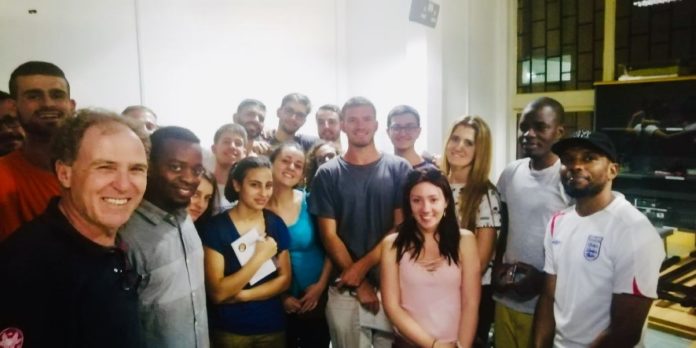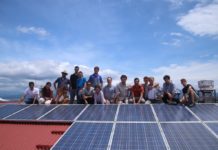by Beatrice Mari

After a long journey from Kigali (Rwanda), FSA#13 finally arrives in Uganda on 5th January 2019, at the Makerere University in Kampala.
To welcome us at Faculty of Technology there is professor Francis Mujjuni who shows us the current Ugandan energy situation and the planning for the future.
FSA group with prof. Mujjuni (first from right)
With the “electricity act” of 1999, Uganda was one of the first African countries to divide the electric energy cycle in 3 phases: for the production there are 21 IPP (Indipendent Power Producers), the transmission is controlled by the government and for distribution there are 6 private companies.
Today the electric power installed in Uganda is 972 MW. The 80% of the power is produced by hydroelectric plants: this is obvious because in Uganda there are the sources of the Nile and many other rivers.
Only 23% of the population have access to energy (15% connected on the grid, 8% off-grid) and the 70% of the energy consumption is concentrated in the 3 main cities: Kampala, Entebbe and Jinja. This shows the very limited access to the energy in the villages and there are 2 main causes: high costs and low density population (so it‘s difficult to realize the transmission line).
Thanks to 3GW of PPA (contracts in which a company buys electricity from a producer at a fixed price per kWh so price changes are avoided) this country shows its strong growth and plans to ensure access to electricity by 2040. These contracts are signed to respect the 17 Sustainable Development Goals so Uganda proves to want to develop itself in a sustainable way on the environmental, economic and social level.
This introduction by prof. Mujjuni helped us because is very important to know the situation in a new country to contribute to its development. Then, when we went on the plants we could reason on new sustainable solutions that can improve Ugandan situation and population. All of this gave us awareness of our study and work’s importance.






